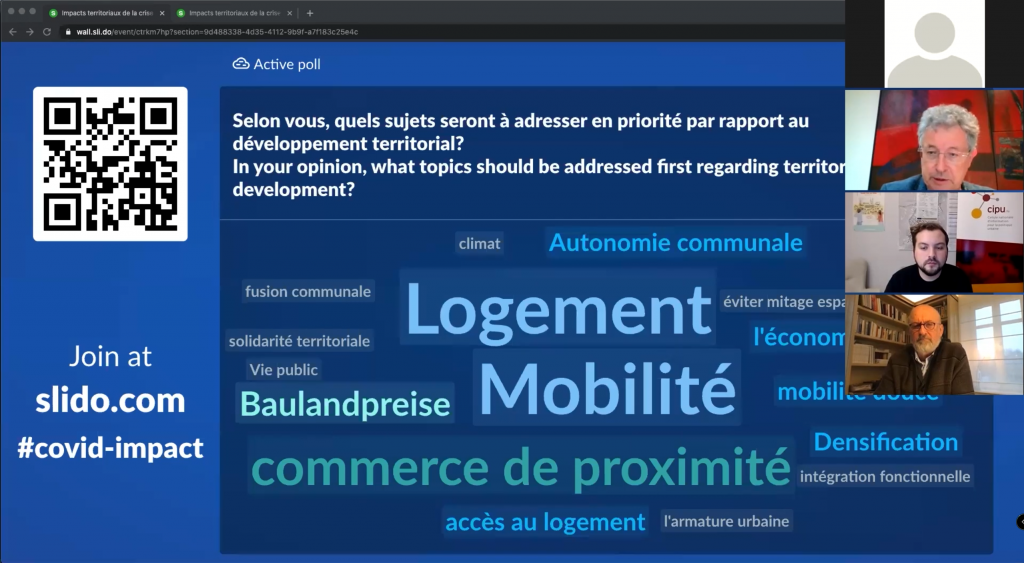Last Friday, the online conference “The territorial impacts of the health crisis linked to COVID-19″ within the framework of the urban-architectural and landscape consultation « Luxembourg in transition » was held. The high-level conference was organised by the National Information Unit for Urban Policy (CIPU) in cooperation with the Order of Architects and Consulting Engineers (OAI) and the Luxembourg Ministry of Energy and Spatial Planning.
During the afternoon, experts and stakeholders presented and debated territorial consequences of the pandemic on Luxembourg:
- How will remote working develop?
- What does the pandemic show in terms of resilience of Luxembourg and the Greater Region as a whole?
- What does the pandemic signify for the many cross-border relations between Luxembourg and its surroundings?
- What social consequences are to be expected and what’s the impact of the pandemic on the societal cohesion within the country?
- ….
Many more questions were addressed from various different angles, be it the national ministry, from the point of view of Luxembourg municipalities, the advisory social council, from planners and architects and more. A recording of the conference with an English translation has been made available here:
The discussion quick came to the conclusion that increased occurrence of remote working is only one of the many consequences of the pandemic. The pandemic has impacted far more elements in Luxembourg: transport and mobility, public finance and social cohesion, just to name a few. Additionally, the border closures have also strongly impacted the perception of national borders of Luxembourg residents.
All these changes result in behavioral adaptations of persons living and working in the country. Not all of these changes will likely disappear after the pandemic: the booming of online shops and the consequences for inner city commerce, the increased shift towards remote working post-COVID and more will potentially stay. Legislative adjustments pave the way to more lasting changes, for example the adapted double-taxation agreements between Luxembourg and the neighbouring country, allowing for extended periods of home office from a foreign country.
Such long-term changes will also manifest in territorial consequences, be it in a changing mobility behaviour, decentralisation of workplaces or a stronger focus on family and relatives. And also future recovery measures will have, depending on their design, territorially different impacts across Luxembourg and the Greater Region.

In conclusion, the key-note speakers and attendees of the conference highlighted that the pandemic will likely increases social and economic inequalities. This can be observed at different scales, both within the country and between Luxembourg and its neighbours. Depending on the design of recovery measures, these inequalities can either be reinforced or softened.
Post-COVID recovery measures can thus have great leverage: if conceived intelligently, policy measures can contribute to induce long-expected changes to the way we live and work. In this regard, the pandemic does not only present a challenge but also an opportunity.
For example for combatting the climate crisis, our established societal systems and the way we live and work needs to undergo structural changes. To reduce our greenhouse gas emissions and to adapt to the changing climate, we need to act more in line with sustainability objectives, which has long been advocated. The pandemic has shown that once the right incentives are in sight, societies can swiftly adjust, and they are also capable to recover from external shocks.
However, there’s no blueprint on how to master the transition. Knowing that measures have different impacts at local, national and cross-border level, policy-makers need to test policies and embrace for some decisions a ‘trial and error’ approach. One way to reduce uncertainty is to build policies more strongly on local knowledge through participation processes.
The upcoming years will allow to assess the success of Luxembourg and European measures to combat the impact of the pandemic. They will also show which of the changes have survived and also what lessons we have drawn from the current situation.
In order to provide an overview on the numerous territorial impacts, CIPU drafted an input paper during December 2020 as preparation for the conference (in French). The input paper can be downloaded here.





